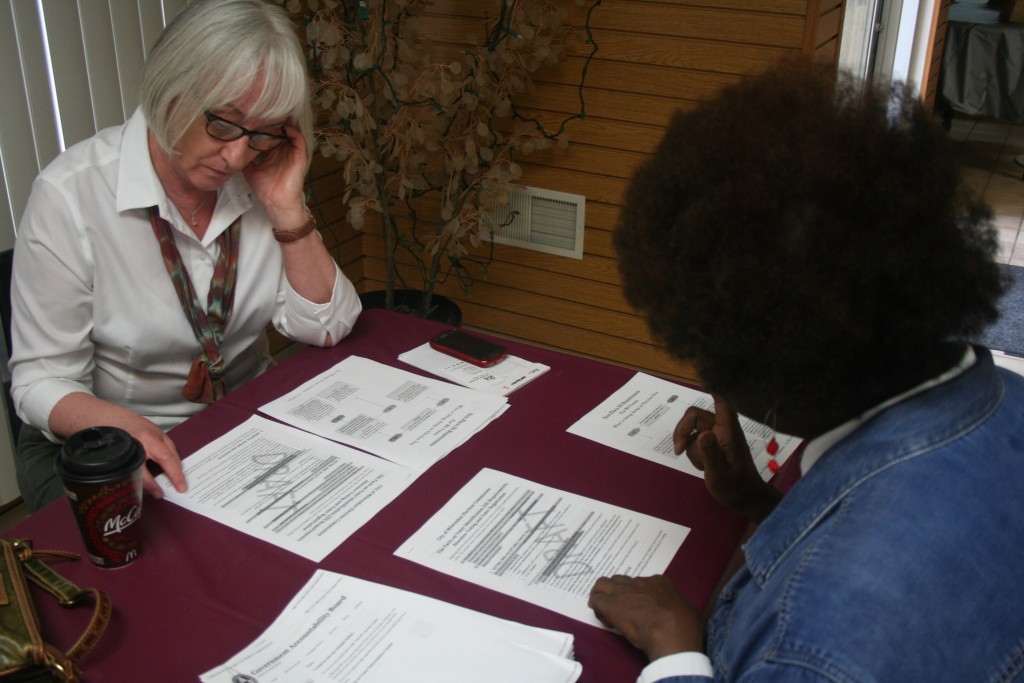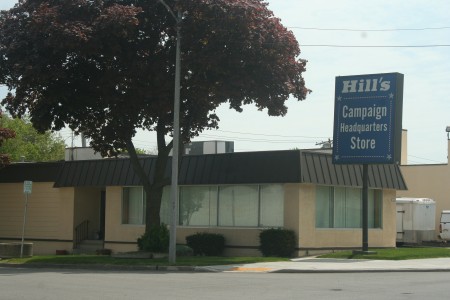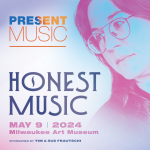Working to Help People Get Voter ID
70% of voting age minorities in the county lack a drivers license; community workers provide help for those seeking ID.

Anita Johnson (right) takes Janice Erickson through a list of voter ID requirements, as outlined by the Milwaukee Election Commission. Photo by Jabril Faraj.
On a recent Saturday morning, John Hill opened Hill’s Campaign Headquarters Store at 7984 W. Appleton Ave., a place people know as the “Old Obama Office,” for an information session to educate residents on Wisconsin’s voter ID requirements.
The location served as a headquarters for the highly touted grassroots campaign that catapulted the president into office in 2008. “It was nonstop; people were here every day,” said Hill.
The night of the election, Hill said, about 75 people were packed into the place. Right before the polls closed, a 40-year-old woman spoke up — she had never voted before and wanted to. “So, I got in my van and took her up to over here on Silver Spring for her to vote,” said Hill.
According to Anita Johnson, a community organizer with Citizen Action of Wisconsin, last-minute voting and mobilization may be in jeopardy because of a restrictive Wisconsin Voter Photo ID law that will be in effect for next year’s spring election. A federal trial judge had previously blocked the Voter ID law, writing that it would “deter or prevent a substantial number of the 300,000-plus registered voters who lack ID from voting.”
“This law does target people of color,” Johnson said at an information session Saturday about the law’s requirements. “I believe that’s what it was designed for.”
The law requires voters to show a Wisconsin driver’s license, state identification card, military ID or U.S. passport at the polls. The address on the photo ID does not need to be current when voting.
In March, the United States Supreme Court declined to hear an appeal of a decision by a three-judge panel of the United States Court of Appeals for the Seventh Circuit that upheld the law as constitutional. The Voter ID law, originally passed in 2011, was temporarily blocked by the Supreme Court for last year’s November election and was not enforced in the recent April election.
A 2005 analysis by the UWM Employment and Training Institute showed that black and Hispanic adults in Wisconsin were about half as likely as white adults to have a valid driver’s license. For those ages 18 to 24 the situation was even more striking — white young adults were almost three times as likely to have a valid license than their African-American counterparts. In Milwaukee County, where much of the state’s black and Hispanic population lives, only 70 percent of voting-age adults had a valid driver’s license.
In addition, an estimated 23 percent of Wisconsin residents 65 and older — more than 175,000 people — did not have a driver’s license or photo ID. Critics have also said the law disproportionately affects poor and transient populations, students and women.
“This could change the desire to vote drastically because not everyone has an ID card; neither do they know where to go to get the information,” said Keith Bailey of Milwaukee Matters, a group formed to aid victims of violence and their families.
In addition, early voting hours have been pared down and are no longer available on weekends.
Only a couple people attended the information session, but Bailey said that shows how important it is to start the push to get information out as soon as possible. “If we wait until January, if we wait until December, if we wait until November or until the kids go back to school … we’ve waited too long,” he said.
Erickson said she has a good base of knowledge about the law but attended the session so she can educate people in the Kenosha and Racine areas.
Education — for voters and poll workers — is critical between now and the next election, said Johnson. “I found in 2011 (when the law was in effect for an election) the poll workers were more confused than the voters.”
She said poll workers were looking at names on the IDs (which do not have to match the voter rolls exactly), addresses (which do not have to be current) and wouldn’t accept passports, she said. In any case, people shouldn’t be turned away from the polls, she said. “If there’s any question, then that person should be given a provisional ballot.”
There is an exception to the law. Permanent absentee voters — those indefinitely confined to their home because of age, illness or disability — will not be required to provide an ID when requesting a ballot.
Bailey also noted that the Department of Motor Vehicles is issuing free IDs as well as providing people with the resources to acquire a birth certificate, one of the documents required to get a driver’s license. Bailey thinks free IDs should be issued indefinitely. “If you take away the opportunity to get an ID, you take away that person’s vote. And, you can’t take away that person’s vote, not in America,” he said.
“If we’ve got to do this one person at a time, it’s worth it.”
Another information session will again be held at Hill’s Campaign Headquarters Store on June 3rd at 5:30 p.m.
This story was originally published by Milwaukee Neighborhood News Service, where you can find other stories reporting on fifteen city neighborhoods in Milwaukee.


















Am I really supposed to believe that 70% of adults in Milwaukee County conduct no banking, do not buy alcohol, do not rent videos, do not have a library card, receive no government subsidy, purchase no tobacco, do not go to bars, do not go to the casino, or any participate in ANY other activity that requires an ID? I’ve heard that 98% of stats are made up on the spot, but this has to take the cake. Oh, that’s right….they said had a valid driver’s license. SO WHAT if they don’t have a valid driver’s license. Did they bother to ask if they had any other form of ID? That would be the useful data, but 70% sounds better when trying to push the false narrative that someone is getting disenfranchised by showing a card that says they are who they say they are. “They don’t know where to go to get an ID.” This is another one I’m supposed to believe? Once we eliminate people who can read, can conduct an internet search, can make a phone call, or can ask another human a question, how many people are left who can legitimately say they don’t know? If I didn’t have an ID and read this article, I would be insulted as to how stupid and helpless people who spout this drivel think I am. These excuses the disenfranchisement crowd comes up with are truly ridiculous and pathetic and the law already makes exemptions for the only legitimate concerns.
That’s quite a rant Joe. Do you object to the effort to help people get voter ID?
Help away.
Joe, Wisconsin passed an extremely restrictive voter ID bill. One cannot use a library ID to vote. Many people in WI do not have the ID required–mainly the elderly, students, and people living in inner cities. Some people are unable to obtain a registered birth certificate. If a woman is married, she needs a certified marriage certificate. If she has been divorced, then she needs proof of that. It costs money to obtain these documents.
Jane, the library card was not an example of an ID. It was an example of something that one needs an ID in order to obtain.
Birth certificate is not required to obtain an ID – http://www.dot.wisconsin.gov/drivers/drivers/apply/petition-process.htm
If you can afford the fees for the marriage license and/or the divorce proceedings, you have the $20 to get a copy of that certificate.
How does living in the inner city pose a barrier to obtaining an ID? In fact, it would be easier because of the easy access to public transportation. Buses are efficient, handicap accessible, and inexpensive.
There are no students that do not have an ID. They can vote absentee in their home district without incurring additional inconvenience or they can go through the steps to officially claim residency here and switch over their documentation.
After all the false barriers are removed, there are literally a handful of people who it may actually be an issue for. Guess what? Per the law, they’re exempt. There is no disenfranchisement going on to any group……well, that’s not totally true. The law is a burden to the lazy.